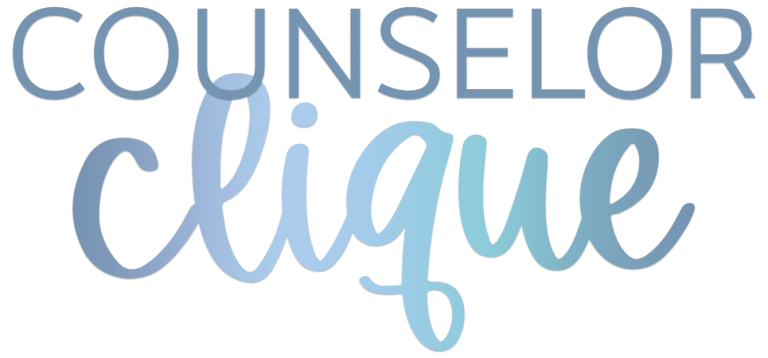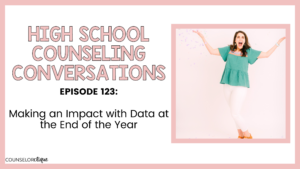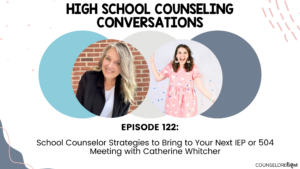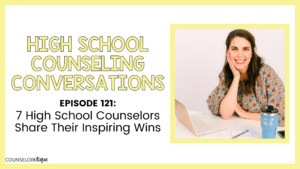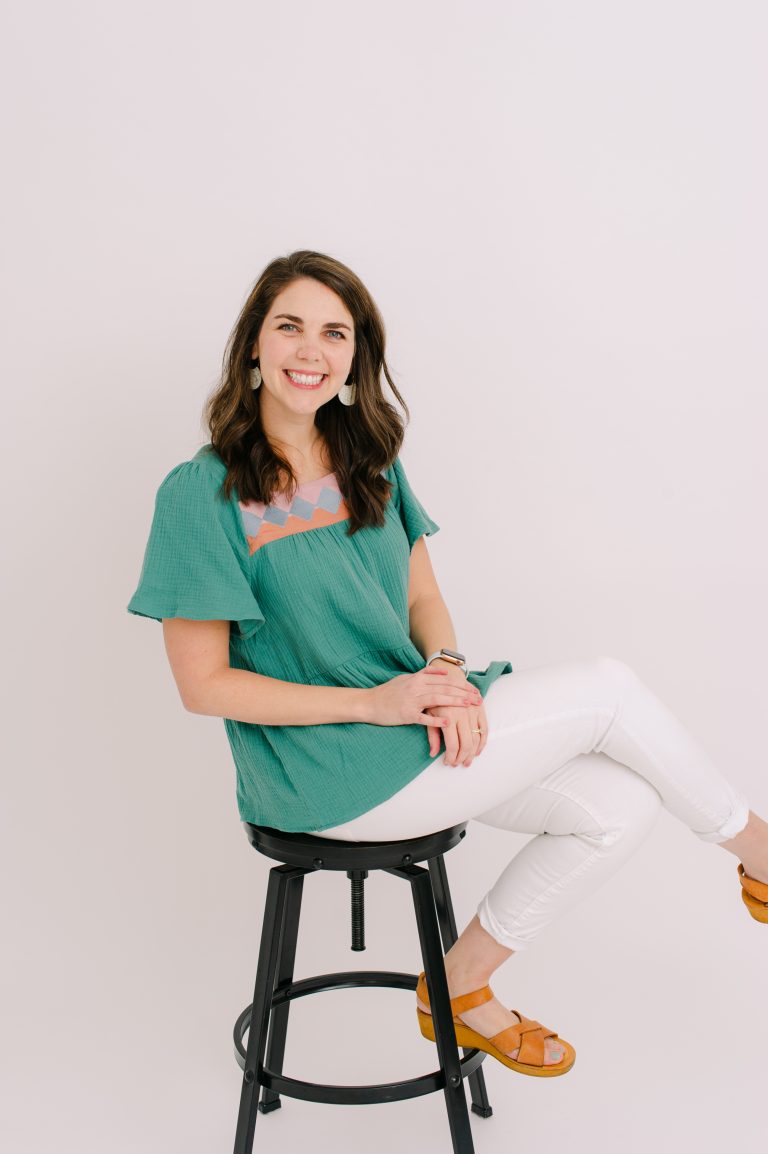
Here's What to Expect In This Episode:
Have you ever offered an idea during a team meeting only to have it shut down? Are you nervous to try something new in your counseling program out of fear that it won’t be well-received? I’m sure we’ve all felt this way at one point or another.
As high school counselors, we often fall behind the scenes and even discount our own value. That’s why I was so excited when I saw the new Oatly marketing campaign (yes, the oat milk) and knew I needed to share my thoughts about it with you.
Oatly recently released a very unique and creative marketing strategy that I’m sharing all about inside this episode. It’s a powerful reminder to get out there and present your creative ideas, implement new initiatives, and ask the questions that no one else is asking.
You have the power to create a culture where new ideas are welcomed and nurtured, even if it means doing the opposite of what everyone else is doing. I can’t wait to hear the changes that come to your school as a result of you thinking outside the box!
Topics Covered in This Episode:
- Details of the new Oatly marketing campaign, including their email newsletter called “Spam” and their use of billboards (and what we can learn from it!)
- The importance of being open to new ideas and fostering a culture of creativity within your counseling team
- An encouragement to ask the burning questions, and offer your suggestions, instead of being nervous about criticism or negative feedback
- Examples of questions that led to successful initiatives in my counseling program
- Nurturing the options of others, even if they are different than your own
Resources Mentioned in This Episode:
- Sign up for a free counselor account on Everfi
- Follow Everfi on Instagram
- Check out the Instagram post that sparked the idea for this episode!
- Follow @tonicsiteshop on Instagram
- Oatly’s newsletter
- Check out more blog posts and podcast episodes about advocacy
- Leave your review for High School Counseling Conversations on Apple Podcasts
Other Blog Posts You Might Like:
Read the transcript for this episode:
Let’s start out this episode with a review from Erica1109. Erica called this review “Conversation With a Friend” when she left on Apple Podcasts and she said, “I love this podcast. This is my first year as a high school counselor and Lauren’s podcast has been the best guide through the new adventure. Each episode feels like sitting down with a best friend that is sharing the secrets to their success.”
Thank you, Erica, for those kind kind words. I’m so glad this podcast can feel relatable and inspirational as you make, well I’m sure sometimes trudge, your way through the new landscape of high school counseling. I’m glad to have you here as such a dedicated listener.
Did you know that it’s super easy to leave a review for the podcast. If you’re listening on Apple Podcast right now go to the show’s main page and scroll down past the episodes. You’ll see a spot where you can tap to rate, five stars maybe, and also leave a review right under those stars. Your reviews help other high school counselors find the podcast and I read and appreciate each one of them. Maybe yours will be read out loud next, on our next episode.
I was inspired to record this episode of High School Counseling Conversations from an Instagram post I saw a few weeks back actually. This post was a carousel post you know, the one where you swipe through to read a few insights or tips. And it came from a website design feed called At Tonic Site Shop. I found them lately sharing interesting marketing type tips with some behind the scenes strategies, which is something that I think is kind of cool about how some big brands have done unique things to change an audience’s response.
So for example, they had a post a couple of weeks ago from the Stanley Water Bottle Company. And now this brand that this post was about Oatly Oatmilk O A T L Y. I’ve always loved learning about this kind of really practical stuff like think Malcolm Gladwell books, if you’ve ever read those with lots of compelling real world examples that really just stick with you that you remember after you read them.
So in this episode, I’m going to tell you a little bit more about this post that I saw and Oatly’s new marketing strategy. And then I want to break it down to relate it to high school counseling because as soon as I read it, I’m not kidding you, I thought there were so many parallels here to high school counseling. It sounds really weird, but it’s immediately what I thought of.
I shared the post to my story and a follower asked what stood out to me about it and wanted to hear my opinion. And I quickly realized that it could be an entire podcast episode. So here we are.
You got into this profession to make a difference in your students lives. But you’re spread thin by all the things that keep getting added to your to do list. I can’t create more hours in the day, but I can invite you into my counselor clique where you’ll finally catch your breath. Come with me as we unpack creative ideas and effective strategies that will help you be the counselor who leaves a lifelong impact on your students. I’m Lauren Tingle your high school counseling hype girl. Here to help you energize your school counseling program and remind you of how much you love your job.
First things first, let’s talk about Oatly’s new campaign and what this post hinged on. I’ll kind of give you the background. Oatly launched an email newsletter. Okay, cool. Lots of people have emailed newsletters. I laugh though, because like, Is there even a need for an oatmilk newsletter? I’m not sure I don’t know that I need to be subscribed to it. But I bet that’s how all of this started anyways. The noteworthy thing is not that they created and launched a newsletter. It’s actually what they called the newsletter and then how and where they launched it into the world.
So the newsletter was called Spam. So you got to it by going to oatly.com/spam something you willingly sign up to get to your inbox called spam. Okay, so there’s something different that you don’t see every day. Memorable, kind of funny.
They bought two giant billboards in New York City, you know, the ones that like scroll through and flip through, and not just one of them, but a second one right next to it. None of their competitors were doing this, Like why buy giant ad space somewhere that’s not even clickable. You see that on a billboard or a subway, then you have to go open up your phone, type in that web address, and then sign up for the email newsletter. Would their money be better spent on a Facebook ad for people who are already scrolling their phone? Maybe. But that’s what everybody else was doing.
Maybe their primary goal wasn’t to get new people signed up for the newsletter. Maybe it was just to get people talking about Oatly. Conversations over conversions. That’s what this post had said. Well, how did they arrive in this creative space? Maybe their team sat down and didn’t say no immediately to any off the wall suggestions.
I had a co-counselor at the department head for the first few years of my working with this specific group who was pretty adamant about never saying no to something flat out. And I actually love that about her. It was a way that she really heard all the ideas and really inspired creativity among us. I really value that openness that she had with us. For the new kid on the block, that was me, she really made me feel heard and appreciated. Even if we didn’t move forward with my idea, I felt like it gave me the space to brainstorm out loud and with others. That open creative space helped new ideas flourish, and it facilitated a safe space between counselors to be heard. Like I’m know I’m not the only one who felt that way.
If you’re a department head, or you’re on a team, where you can have some impact on the space where you drop new ideas or process them, how can you shape this culture into a place that’s open and receptive to those new ideas? How can you nurture someone’s opinions, even if they’re not your own? Can you hear them out and help them think through the holes? Are you willing to walk with them from the beginning to the end to see what ideas might stick?
I think when we constantly shut down or we are constantly being shut down, we’re less likely to bring those new ideas to the table. Creativity is stifled. Counselors are problem solvers. And so many of us find new and creative ways to get to the end results that we’re really aiming for. For better or for worse, we’re forced to think on our toes and adapt to a changing environment.
I imagine Oatly’s creative marketers sitting around a table asking each other, “Wouldn’t it be funny if we bought two huge billboards? What if we plaster the subway stations with Oatly paraphernalia as far as the eye can see?” I’m sure it cost them more money than our ideas as high school counselors cost. But what I want you to see here is how the open ended questions can lead to potentially risky ideas.
Instead of being nervous about criticism or negative feedback, what if we let our questions stew and then throw them out and see if they stick? Pose a question and let it roll around and see what other thoughts our teammates have? I swear that my co-counselors and I always came up with the best ideas out of questions like, I wonder why this or I wonder what would happen if we did that?
For example, I wonder why a lot of students sitting in seat time recovery our English Language Learners? I wonder what would happen if we sent home more communication in Spanish? I wonder why the students who are all missing school and have poor attendance aren’t involved in any clubs or sports? What would happen if we just got them connected to an adult in the school who checked in with them? Maybe they just aren’t tethered to any meaningful connections in the building.
A lot of our students seemed stressed and our needs assessment showed it too. I wonder what we could do to reach a lot of students at once to make a big dent in this? Wouldn’t it be funny if we had a silent disco in the gym? Those are just three conversations that started out with the sorts of questions that evolved into much bigger things like newcomers small groups held in Spanish, a very successful attendance initiative rooted in relationships, and a memorable and fun school wide mindfulness day.
Oatly didn’t sit back and fear of being made fun of for doing something completely different than everybody else. And maybe you need to hear that as part of a team. And I bet you won’t be hated for bringing up your new ideas. But it’s likely you’ll get pushback or hear no, we’re not doing it that way. Or no, we’ve never done it that way or flat out. No, that won’t work. I heard that last one a lot. And that’s where I’ll say but what if it does work? I guess that’s where my number one strength finder positivity comes in.
Your students ever complained about not learning the stuff that actually connects to the real world while they’re in high school. I get that. I never use a quadratic formula in real life either. But what if we equip students with something we knew they’d use in their lives after high school? Introducing EverFi’s free Interactive Financial Literacy Lessons that simplify concepts like budgeting, filing taxes and saving money. Since you know I’m all about actionable strategies when you’re listening to this podcast, I want you to hop on over to everfi.com/counselor to sign up for your free counselor account. As soon as you’re in, you get access to hundreds of free classroom lessons for your students. Just in time to celebrate big for April’s Financial Literacy Month. Head on over to everfi.com/counselor That’s EVERFI.com/counselor or click the link in the show notes to access your free account.
Instead of just being okay with being written off, make others care about what you do. Cause a scene until someone notices. Counselors can easily fall behind the scenes and go unnoticed because our job is behind the scenes. A lot of what we do with students isn’t shareable due to confidentiality. So we don’t even think to come out swinging with data or put ourselves in front of an audience even if we could guarantee that we would have huge strides in the name of advocacy for ourselves, our program our students.
I’m gonna give you a quote from Kevin Lynch, Oakly’s creative director. He said that being ignored was worse than being hated. People don’t care what you have to say. If you don’t overcome that, nothing else matters. Do you feel like this as a counselor? Your administrators or your teachers don’t care what you have to say. That sounds harsh, but I can definitely think of times that I felt like this. I felt like I was shouting, and no one was listening. Like I was behind a glass wall, like banging on the glass, somebody looked at me and pay attention to me.
But I knew that if they just listen, their minds would be changed. I knew it down deep. About things like our roles, the importance of what we’re doing, the actual tasks that we’re actually doing, I could go on and on. Well, why should they care? How do we make them care? Oatly, for one, made them care about a seemingly pointless newsletter by putting it in their face and making them notice.
Kevin Lynch’s advice is to stand out, basically do the opposite of what you’ve been doing, or what everybody else is doing, or what they expect you to do. And that’s where you get to be creative. What makes you different? Or what could make you different? Get after that. How often do we discount what we’re doing even to our own peers?
Have you backed out of applying to present at a conference or sharing your expertise in a group setting just because you think no one wants to or needs to hear what you have to say? I think back to when the counselors in our district would get together about once a month for announcements, guest speakers, kind of like a general PD where we all touch base. And our supervisor would ask he would always pose to the group, what great things are you all up to in your schools right now? What’s working right now? And I was always amazed how no one would speak up when I knew that they were doing things in their department because I was talking to them on the phone and stuff. But no one was sharing in front of everyone.
I wonder if it was that voice in their head that saying this is not that great of an idea, or people are already doing this. It’s nothing new. Your expertise and your experiences make your ideas valuable. People need to hear them.
I have an interview with my former principal coming up next week, where he mentions the intersection of counselor advocacy and persistence as an actual strategy that can make big moves happen in your school counseling program. I’m excited for you to hear that conversation because he was a leader who also gave my team some freedoms in really creative ways to solve problems for our students and our school.
I hope you leave this week’s episode with some inspiration to open the floor in your department meeting to some open ended questions. Don’t be afraid of daydreaming big and thinking outside the box. Even if that means pushback or initial confusion. I can’t wait to hear how your department or your school’s culture changes because of the way that you fearlessly present, listen to, and ultimately implement new ideas. I’ll see you next week.
Connect with Lauren:
Cheers + Happy Listening!
Like what you’re hearing? Follow and leave a review on Apple Podcasts. It helps other high school counseling friends find it!
Can’t contain your excitement? Share the pod! Tell a friend! Your word-of-mouth referrals mean the world to me!

